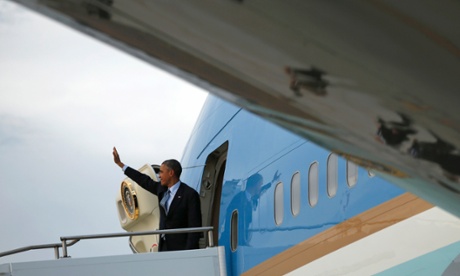
World leaders have forced Australia to include stronger language on climate change in the G20 communique, but Tony Abbott told the summit that as the leader of a major coal producer he would be “standing up for coal”.
The references demanded by other leaders, including the US president, Barack Obama, were reluctantly accepted by Australia at the last minute. They included a call for contributions to the international green climate fund that the prime minister has previously derided and for the “phasing out of inefficient fossil fuel subsidies”.
A European Union spokesman reportedly described the climate negotiations with Australia as being like “trench warfare”. Other officials said it had been “very difficult” and protracted.
Speaking to the media after the summit, the Australian prme minister downplayed the importance of the “green climate fund” to which Obama pledged $3bn on Saturday and the Japanese prime minister, Shinzo Abe, $1.5bn on Sunday. He took a similar line on the new greenhouse reduction pledges unveiled by Obama and the Chinese president, Xi Jinping.
He said all nations “support strong action … to address climate change”, but added: “We are all going to approach this in our own way and there are a range of [climate] funds which are there.”
Obama and the UN secretary-general, Ban Ki-moon, both urged G20 countries to contribute to the green climate fund, which is seen as critical to a successful outcome at crucial climate negotiations in Paris next year. In the end, at Australia’s insistence, the communique called for contributions to financing funds “such as the green climate fund”.
Obama said the US and Chinese agreement meant there was “no excuse for other nations” not to make similar commitments on greenhouse gas reductions.
But Abbott said by his reading the deal “means 80% of China’s power needs in 2030 are still going to be provided by coal”. He said coal was critical to lifting 1.3bn people out of poverty, and “what we need to do is to ensure that the coal-fired power stations we need are as efficient as possible”.
The Australian treasurer, Joe Hockey, also downplayed the deal earlier on Sunday.
“Barack Obama has to get any initiative on climate change through a hostile US Congres,” he said. “So far he hasn’t had great success.”
As Obama explained again on Sunday, the US “shaped that target based on existing authorities” to use Environment Protection Agency powers “rather than the need for additional congressional action”.
Abbott began the closed-door discussion on energy on Sunday morning by telling the world leaders that “as the world’s largest producer of coal, I’d like to stand up for coal”, sources told Guardian Australia.
Speaking to the press after the meeting, Abbott denied Australia had been forced into climate discussions, saying “the very first draft [of the G20 communique] talked about climate change, all the way through we have been talking about energy efficiency and climate change”.
As revealed by Guardian Australia, the first draft did include climate change, but in very general terms. But European countries and the United States argued until late on Saturday to force the host country to strengthen the words - including the commitment to the green climate fund, which Abbott has previously said Australia would not support.
Australia was also reluctant to include the reference to fossil fuel subsidies in the communique, but it was eventually included after forceful support from Obama. The communique calls on G20 members to “rationalise and phase out inefficient fossil fuel subsidies”.
As the G20 progressed, the Queensland government was preparing to unveil new infrastructure spending to help the development of Australia’s largest coal mine.
.Abbott, who recently said coal was “good for humanity”, also endorsed the mine, proposed by the Indian company Adani, at the leaders’ meeting.
The Queensland premier, Campbell Newman, has said the new spending would help coal development in the Galilee basin, which has been under a cloud because of the declining coal price.
The announcement is expected to be made during the visit of the Indian prime minister Narendra Modi, who is addressing federal parliament on Tuesday, and the chairman of the Adani group, Gautam Adani.
“We are prepared to invest in core, common-user infrastructure. The role of government is to make targeted investments to get something going and exit in a few years’ time,” Newman said.
“It will be open access [infrastructure]. We want a new coal basin to open.”
In an interview from Brisbane with the Indian Express, Adani said the Australian government had given all environmental and regulatory clearances for the $7.5bn coal, rail and port project.
The Carmichael mine in the Galilee Basin is the one of the largest thermal coal mines in the world, and the largest in Australia. It requires a 388km rail line to a new terminal at Abbot Point.
But the project has been under pressure as coal prices fall to five-year lows.
Adani told the Indian Express a South Korean firm, Posco, had been given the contract to build the railway line and sources suggested the Newman government might be preparing to underwrite the project.
The director of energy finance studies for the Institute of Energy Economics and Financial Analysis, Tim Buckley, said the Newman government’s plans were “absolutely farcical”.
“I have not spoken to a single person in finance who thinks this can proceed or that it is commercially viable. Eight major international banks have said they won’t go near it,” he said.
Adani says it has already invested $2bn in Australia, but it has no equity here. It bought the rights to the Abbot Point port with loans from a syndicate headed by the Commonwealth Bank and Westpac, and another loan from the State Bank of India.
